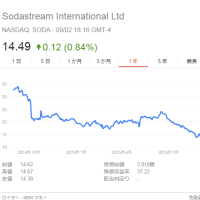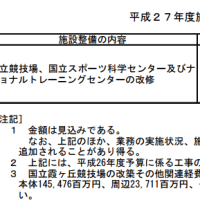去年のことになるが、死刑廃止国際委員会(International commission against the death penalty:ICDP)という委員会が設置された。
目標は、2015年までに全ての国で死刑のモラトリアム(廃止も含む)を実行に移すことらしい。
この辺は以下参照(手抜き)
・Abolition of the Death Penalty - New 'De Facto' Millennium Goal(2010年10月7日 IPSNEWS)
・Can we stop the Death Penalty(be4 2015)?(2010年10月 flagburner's blog(仮))
で、今月10日と11日にかけて、ICDP が4回目の会議を開いたのだが・・・。
・4th Meeting of the ICDP: First Anniversary and Permanent Installation in Geneva(2011年10月12日 icomdp.org)
・"The Death Penalty Has No Dissuasive Effect"(2011年10月10日 IPSNEWS)
この会議で主に対象となったのは、死刑制度が存続してる国が多いアフリカ諸国と天下の死刑大国(?)中国。
それと、薬物犯罪を行った人達に対する死刑執行に関する議論も行われたらしいが・・・。
以下、2011年10月12日分 icomdp.org『Meeting of the ICDP~』から、終盤部分を(略
---- 以下引用 ----
(中略)
During the meeting, particular attention was devoted to the African continent, China and the issue of the death penalty for drug-related offences.
The situation in Africa was presented by Sylvie Kayitesi, Chair of the Working Group on the Death Penalty of the African Commission on Human and Peoples Rights.
Furthermore, Emeritus Oxford Professor Roger Hood and Patrick Gallue of the London-based International Harm Reduction Association provided the members of the ICDP with valuable inputs on the situation of the death penalty in China and on issue of the death penalty for drug-related offences.
In the context of its forth meeting, the ICDP also met with the UN High Commissioner for Human Rights, Navanethem Pillay.
(以下略)
---- 引用以上 ----
去年薬物犯罪に関わった人に死刑執行したのは、少なくても中国・イラン・サウジアラビアの3カ国(マレーシア・北朝鮮・ベトナムはその可能性が高い、イラク・イエメン・シリアに至っては詳細不明)。
この辺は、国際健康被害軽減学会(International Harm Reduction Association:IHRA)の出した報告書も参照(手抜き)
・The Death Penalty for Drug Offences: Global Overview 2011 - Shared Responsibility & Shared Consequences(2011年9月14日 ihra.net;.pdfファイル)
で、IHRA の報告書では、薬物犯罪で逮捕→死刑宣告→死刑執行を喰らった人達に外国籍の人が多い、という指摘もあった。
以下、2011年9月14日分 ihra.net『The Death Penalty for Drug Offences』から、『1.3 Foreign nationals disproportionately sentenced and executed』を(略
---- 以下引用 ----
(中略)
1.3 Foreign nationals disproportionately sentenced and executed
Careful inspection of capital drug laws reveals deep disparities in how these laws are applied.
Very often, non-nationals comprise a majority or even a totality of those sentenced to death and/or executed by a state.
In these circumstances, there are major concerns of discriminatory law enforcement practices and sentencing, as well as failures to honour due process norms and provide access to consular assistance.
It is for these reasons that, where possible, the number of foreigners sentenced to death and/or executed has been highlighted in this report.
The cases of foreigners on death row tend to ‘hit home’ when a country finds one of its own citizens sentenced to die for carrying drugs abroad.
Even the general public in retentionist countries responds angrily to sympathetic cases of its most vulnerable citizens facing capital punishment abroad after clearly having been exploited by drug trafficking organisations.
These incidents highlight how the issue of the death penalty for drugs is a matter of shared concern for both abolitionist and retentionist countries that support international drug control efforts, as well as those that cooperate with countries that enforce the ‘ultimate sanction’ to combat drugs.
(以下略)
---- 引用以上 ----
こういう事例は、報告書の P.17-P.20 にも掲載されてるので読んでくれい(無責任)。
つか、薬物の取り締まりと死刑制度の問題が関係してるってのは、正直想像つかなかった。
しかし、これが絡むのは、薬物の取り締まりが行われた結果として笑えない人権侵害が横行してる国が結構多いため・・・らしい。
以下、2011年9月14日分 ihra.net『The Death Penalty for Drug Offences』から、『3.2 The death penalty and international cooperation in drug control』の一部を(略
---- 以下引用 ----
(中略)
3.2 The death penalty and international cooperation in drug control
Drug control is frequently referred to as a ‘shared responsibility’.
However, given the fluidity and transnational nature of the resources and intelligence that are shared, it is difficult to ensure that an abolitionist country will not facilitate the execution of another person, or even one of its own citizens.
Indeed, the startling number of foreigners sentenced to death or executed for drugs demonstrates the human rights risks associated with international cooperation in drug control.
Such concerns have led some countries to publicly question their ability to cooperate in law enforcement actions with states that have capital drug laws without considering the impact on their own citizens.
Some international donor organisations have responded by developing guidelines or conditions to attach to drug control funding to ensure they are not complicit in resulting human rights abuses.
For example, the European Parliament passed a resolution in 2010 that called ‘on the [European] Commission to develop guidelines governing international funding for country-level and regional drug enforcement activities to ensure such programmes do not result in human rights violations, including the application of the death penalty’ and stressed ‘that the abolition of the death penalty for drug-related offences should be made a precondition for financial assistance, technical assistance, capacity-building and other support for drug enforcement’[引用者注].
(以下略)
[引用者注]:2008年に欧州議会が採択した『Human Rights in the World 2007 and the EU's policy on the matter』という決議案を参照。
・Human Rights in the World 2007 and the EU's policy on the matter(2008年3月8日 europarl.europa.eu)
---- 引用以上 ----
なんだろうな。
薬物犯罪で逮捕→死刑宣告→死刑執行を喰らった人達の中には、薬物犯罪の元締めによって「運び屋」として(強引に)選ばれてしまった人もいる可能性もあるしな~。
そうした人達を死刑にしても、結局元締めは健在なわけだし。
その意味では、薬物犯罪で死刑を適用する必然性ってどれくらいあるのか疑問だったりする。
ただ、例の報告書で名前が出ている国で、薬物犯罪を死刑の対象から外すべきって言うと「(薬物犯罪を死刑の対象から外しても)薬物犯罪が減るわけない」という反論が飛んできそうだが。
この辺り、下手すると水かけ論で終わる危険が十分あるのが頭の痛いところ・・・。
それはそうと。
現在日本で行われてる死刑の手法について、土本 武司元最高検検事が意味深なコメントを・・・。
・「絞首刑はむごい」元最高検検事、残虐性に言及(2011年10月12日 asahi.com)
この調子だと、日本では「死刑が残虐刑か否か」じゃなく「残虐でない死刑の方法って何?」という議論が活発になる悪寒・・・。
おまけ:ICDPの会議で上映された映画『Give Up Tomorrow』の公式トレイラー。
Give Up Tomorrow Movie Trailer
この映画は、セブ島で発生した誘拐殺人事件の容疑者になってしまった Paco Larrañaga 氏の無実を訴える人達(当然本人含む)を映したもの。
↓映画の公式サイト。
・GIVE UP TOMORROW(pacodocu.com)
目標は、2015年までに全ての国で死刑のモラトリアム(廃止も含む)を実行に移すことらしい。
この辺は以下参照(手抜き)
・Abolition of the Death Penalty - New 'De Facto' Millennium Goal(2010年10月7日 IPSNEWS)
・Can we stop the Death Penalty(be4 2015)?(2010年10月 flagburner's blog(仮))
で、今月10日と11日にかけて、ICDP が4回目の会議を開いたのだが・・・。
・4th Meeting of the ICDP: First Anniversary and Permanent Installation in Geneva(2011年10月12日 icomdp.org)
・"The Death Penalty Has No Dissuasive Effect"(2011年10月10日 IPSNEWS)
この会議で主に対象となったのは、死刑制度が存続してる国が多いアフリカ諸国と天下の死刑大国(?)中国。
それと、薬物犯罪を行った人達に対する死刑執行に関する議論も行われたらしいが・・・。
以下、2011年10月12日分 icomdp.org『Meeting of the ICDP~』から、終盤部分を(略
---- 以下引用 ----
(中略)
During the meeting, particular attention was devoted to the African continent, China and the issue of the death penalty for drug-related offences.
The situation in Africa was presented by Sylvie Kayitesi, Chair of the Working Group on the Death Penalty of the African Commission on Human and Peoples Rights.
Furthermore, Emeritus Oxford Professor Roger Hood and Patrick Gallue of the London-based International Harm Reduction Association provided the members of the ICDP with valuable inputs on the situation of the death penalty in China and on issue of the death penalty for drug-related offences.
In the context of its forth meeting, the ICDP also met with the UN High Commissioner for Human Rights, Navanethem Pillay.
(以下略)
---- 引用以上 ----
去年薬物犯罪に関わった人に死刑執行したのは、少なくても中国・イラン・サウジアラビアの3カ国(マレーシア・北朝鮮・ベトナムはその可能性が高い、イラク・イエメン・シリアに至っては詳細不明)。
この辺は、国際健康被害軽減学会(International Harm Reduction Association:IHRA)の出した報告書も参照(手抜き)
・The Death Penalty for Drug Offences: Global Overview 2011 - Shared Responsibility & Shared Consequences(2011年9月14日 ihra.net;.pdfファイル)
で、IHRA の報告書では、薬物犯罪で逮捕→死刑宣告→死刑執行を喰らった人達に外国籍の人が多い、という指摘もあった。
以下、2011年9月14日分 ihra.net『The Death Penalty for Drug Offences』から、『1.3 Foreign nationals disproportionately sentenced and executed』を(略
---- 以下引用 ----
(中略)
1.3 Foreign nationals disproportionately sentenced and executed
Careful inspection of capital drug laws reveals deep disparities in how these laws are applied.
Very often, non-nationals comprise a majority or even a totality of those sentenced to death and/or executed by a state.
In these circumstances, there are major concerns of discriminatory law enforcement practices and sentencing, as well as failures to honour due process norms and provide access to consular assistance.
It is for these reasons that, where possible, the number of foreigners sentenced to death and/or executed has been highlighted in this report.
The cases of foreigners on death row tend to ‘hit home’ when a country finds one of its own citizens sentenced to die for carrying drugs abroad.
Even the general public in retentionist countries responds angrily to sympathetic cases of its most vulnerable citizens facing capital punishment abroad after clearly having been exploited by drug trafficking organisations.
These incidents highlight how the issue of the death penalty for drugs is a matter of shared concern for both abolitionist and retentionist countries that support international drug control efforts, as well as those that cooperate with countries that enforce the ‘ultimate sanction’ to combat drugs.
(以下略)
---- 引用以上 ----
こういう事例は、報告書の P.17-P.20 にも掲載されてるので読んでくれい(無責任)。
つか、薬物の取り締まりと死刑制度の問題が関係してるってのは、正直想像つかなかった。
しかし、これが絡むのは、薬物の取り締まりが行われた結果として笑えない人権侵害が横行してる国が結構多いため・・・らしい。
以下、2011年9月14日分 ihra.net『The Death Penalty for Drug Offences』から、『3.2 The death penalty and international cooperation in drug control』の一部を(略
---- 以下引用 ----
(中略)
3.2 The death penalty and international cooperation in drug control
Drug control is frequently referred to as a ‘shared responsibility’.
However, given the fluidity and transnational nature of the resources and intelligence that are shared, it is difficult to ensure that an abolitionist country will not facilitate the execution of another person, or even one of its own citizens.
Indeed, the startling number of foreigners sentenced to death or executed for drugs demonstrates the human rights risks associated with international cooperation in drug control.
Such concerns have led some countries to publicly question their ability to cooperate in law enforcement actions with states that have capital drug laws without considering the impact on their own citizens.
Some international donor organisations have responded by developing guidelines or conditions to attach to drug control funding to ensure they are not complicit in resulting human rights abuses.
For example, the European Parliament passed a resolution in 2010 that called ‘on the [European] Commission to develop guidelines governing international funding for country-level and regional drug enforcement activities to ensure such programmes do not result in human rights violations, including the application of the death penalty’ and stressed ‘that the abolition of the death penalty for drug-related offences should be made a precondition for financial assistance, technical assistance, capacity-building and other support for drug enforcement’[引用者注].
(以下略)
[引用者注]:2008年に欧州議会が採択した『Human Rights in the World 2007 and the EU's policy on the matter』という決議案を参照。
・Human Rights in the World 2007 and the EU's policy on the matter(2008年3月8日 europarl.europa.eu)
---- 引用以上 ----
なんだろうな。
薬物犯罪で逮捕→死刑宣告→死刑執行を喰らった人達の中には、薬物犯罪の元締めによって「運び屋」として(強引に)選ばれてしまった人もいる可能性もあるしな~。
そうした人達を死刑にしても、結局元締めは健在なわけだし。
その意味では、薬物犯罪で死刑を適用する必然性ってどれくらいあるのか疑問だったりする。
ただ、例の報告書で名前が出ている国で、薬物犯罪を死刑の対象から外すべきって言うと「(薬物犯罪を死刑の対象から外しても)薬物犯罪が減るわけない」という反論が飛んできそうだが。
この辺り、下手すると水かけ論で終わる危険が十分あるのが頭の痛いところ・・・。
それはそうと。
現在日本で行われてる死刑の手法について、土本 武司元最高検検事が意味深なコメントを・・・。
・「絞首刑はむごい」元最高検検事、残虐性に言及(2011年10月12日 asahi.com)
この調子だと、日本では「死刑が残虐刑か否か」じゃなく「残虐でない死刑の方法って何?」という議論が活発になる悪寒・・・。
おまけ:ICDPの会議で上映された映画『Give Up Tomorrow』の公式トレイラー。
Give Up Tomorrow Movie Trailer
この映画は、セブ島で発生した誘拐殺人事件の容疑者になってしまった Paco Larrañaga 氏の無実を訴える人達(当然本人含む)を映したもの。
↓映画の公式サイト。
・GIVE UP TOMORROW(pacodocu.com)




















昨年中華人民共和国で死刑を執行された日本人は薬物犯だったわけで、それって中国の人権状態を批判・非難するには格好のネタではないかと思ったのですが、ふだんは声高に中国批判をする「国家基本問題研究所」系統の連中も私の知る限りあまりこの件では発言していないようです。
彼らは基本的に死刑制度支持ですから、あるいはこれで中国を批判したらやぶへびになるという計算もあったのかもしれませんね。彼らの「愛国」とやらの程度が知れるとまで書いたら書きすぎかな。
http://blog.goo.ne.jp/mccreary/e/ce80eb8a88b4ef9d5b7918c78eb19ea8
こんなしょうもない blog でもお役に立てて非常にありがたいです(照)。
>彼らは基本的に死刑制度支持ですから、あるいはこれで中国を批判したらやぶへびになるという計算もあったのかもしれませんね
元々、日本の死刑制度に対する国外からの批判を「内政干渉」と言ってましたからね(苦笑)
下手に例の一件で中国を批判したら、逆に自分達がそれを喰らう可能性を考えたのかもしれません。